#brannon braga
Text
Sexism in TOS: Worst Offender, or Progressive in Retrospect in Comparison?
I see a lot of folks claim that TOS was the most sexist of the Star Trek shows by a landslide -- and while I agree that it definitely suffered from the sexism of the times, I also have other perspectives to share to give some food for thought.
I am of course not insinuating that TOS isn't sexist -- it is, but I have to ask folks to consider the breadth and depth of Berman's sexism in his run and ask yourself: Was Gene Roddenberry genuinely more sexist in his storytelling and delivery than Rick Berman?
I'm not telling you to feel one way or the other, but all I ask is that you hear me out and consider some perspectives and make your own balanced assessments. Nobody is obligated to share my opinion, but it means a lot just to have folks hear it and see their thoughts on the subject. So here is what I was originally responding to:
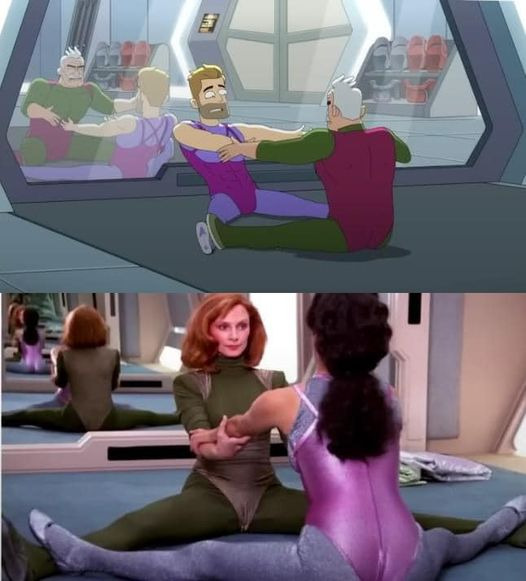
Someone's response to this photo:
"Devil's advocate. This was a part of the popular form of cardio during the production time of TNG. Yes, it was heavily sexualised by men, but so is literally every other way women work out. Men have been caught taking pictures of women while trying to do dead lifts, running on tracks and working on sled machines. They post them online to share too. The fact is, there is no way a woman can be shown working out without it going there. And yeah,t hat includes the combat forms of workout they do in Star Trek. Just look at how Dax dresses when she spars with Worf. Yes, they're dating, but still, same goes when 7 does and any other female.
Aerobics routines like this were made dirty and cringy. This was what women wore then by and large. This is how the workout was done. We make it cringy."
My response to them:
"I respect your take, but I disagree on a few fronts.
The miniskirt was chosen by the TOS female cast, not the male cast, specifically requested by Grace LW and affirmed by Nichelle and Majel who would go on to vehemently defend the miniskirt over the years as comfortable and embraced by them.
Grace said it was comfortable and seen as a symbol of female sexual empowerment during the 60s and thought it would be a progressive garment (and turns out that it was, as it was later adapted and worn by male crew as a skant on TNG) -- FYI those were designed by a gay man and Gene approved them.
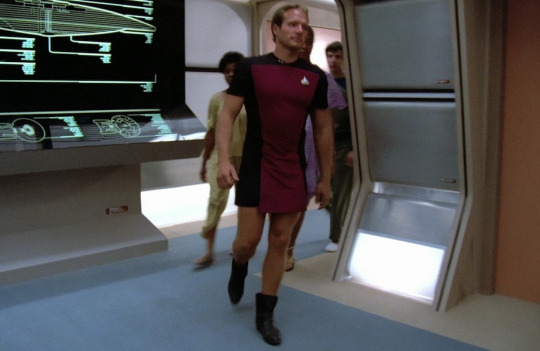
This was also supposed to be Spock's TMP outfit:
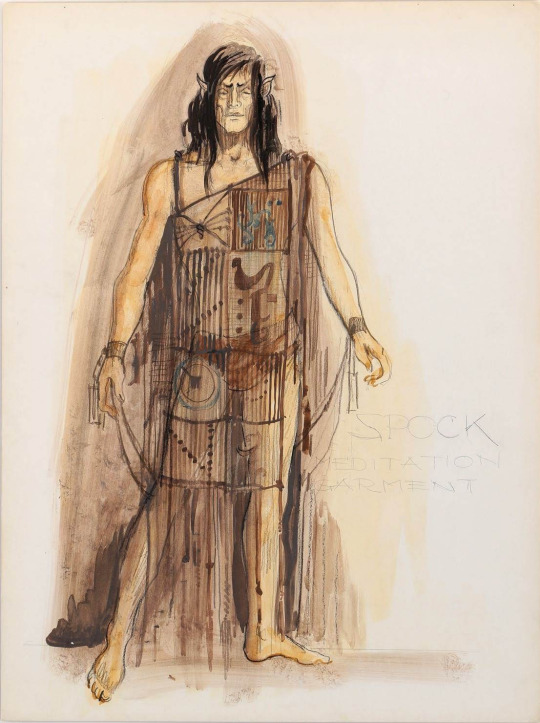
Literally lingerie.
We saw both Uhura (who saves Kirk in from Marlena Mirror Mirror) and Yeoman Landon (the first to initiate combat with a classic Kirk-esque kick to help the Captain being attacked in The Apple) carry out their combat training in their Starfleet uniforms without ever being made to change into any ridiculous workout gear.
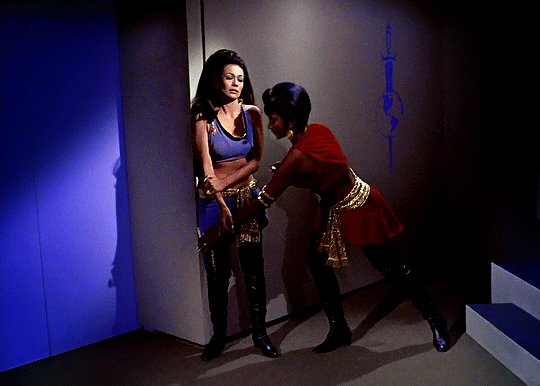

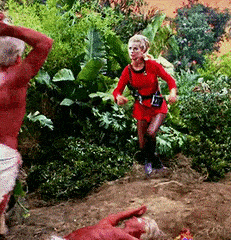
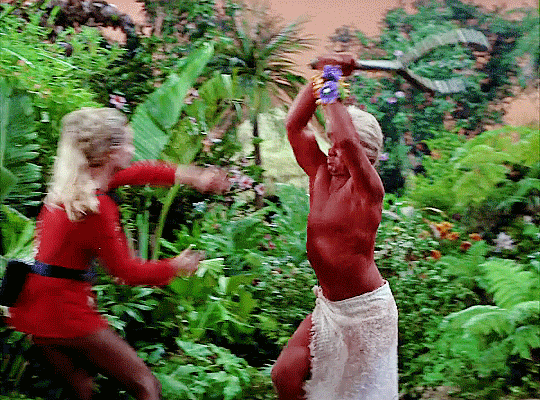
In fact, I'd argue Jim Kirk was sexualized even more than the ladies of the week on the show and I saw his naked body more than anyone else's on a fairly regular basis. He wore red yoga tights while topless in Charlie X while the women wore full length gymnastic suits that covered their entire body. If anything, it went out of its way to avoid sexualizing women practicing fitness in those scenes and instead focused on Kirk.
Gene confessed that he asked to have Shatner filmed in suggestive/provocative ways to "give something to the ladies", so he -- as he said -- liked to "film him walking away" or have him conveniently busting out of his shirts in just about every episode as it were, because Shatner apparently had great assets. LOL
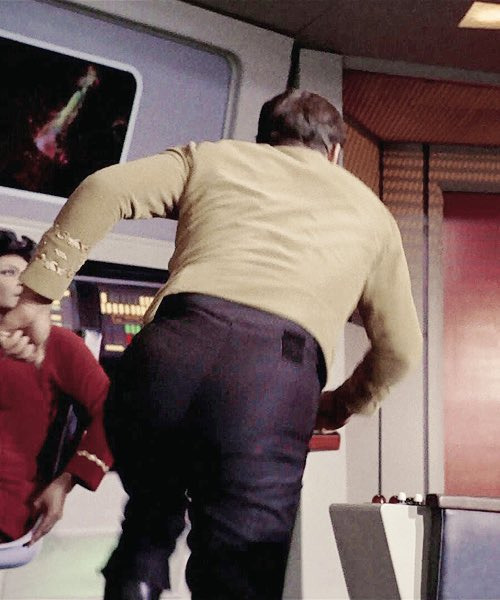
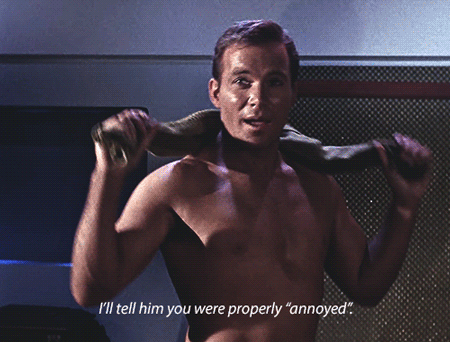
Gene made an effort to at least sexualize both if he was going to sexualize one, and he carried that attitude forward in wanting the m/m and f/f scenes in the background on Risa for TNG. He also insisted that the men and women wear skimpy outfits on THAT TNG planet. You know the one. LOL I mean the dudes even had on less than the women:
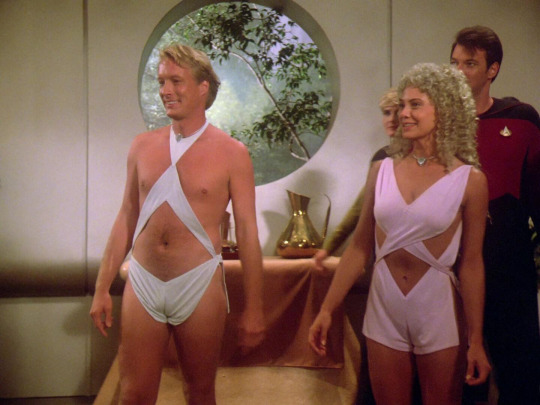
Gene also gave permission to K/S shippers to have their conventions back in the 70s when he was asked for permission. Gene and Nimoy felt with all the skimpy outfits they had the ladies wear, why not let the ladies and gay men have their fun, too? It's how we ended up with moments like this:
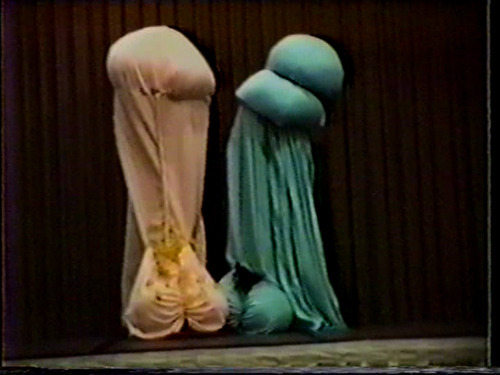
Yes, those are two people dressed up as Kirk and Spock's penises doing interpretive dance. Gene didn't give two damns. LOL
In my eyes, that was a very progressive take on Gene's part for the 60s. It was actually PARAMOUNT STUDIOS who had the big problem with K/S stories and vehemently tried to shut them down. Gene literally hired slash authors on his payroll and even had several slash stories/writers published in his official Star Trek books (The New Voyages & The New Voyages II).
I feel I saw Uhura and women in TOS engaged in more physical combat/altercations defending themselves that Troi or Bev were shown holding their own.
In fact, Kirk used to get furious when someone would "dress up" his female crew members without their consent (Trelane episode, Shore Leave episode) because like his male crew members, he wanted them to be treated professionally and to also have his male crew act professionally.
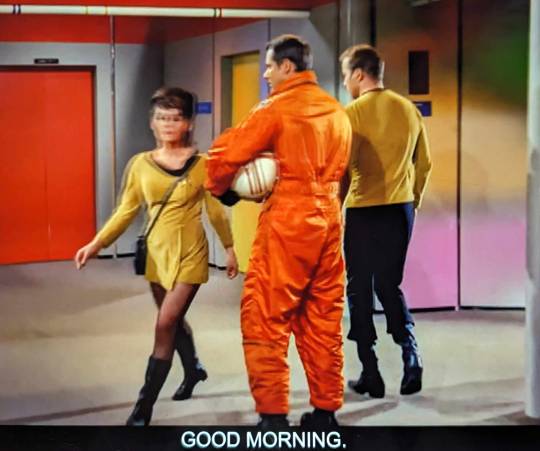
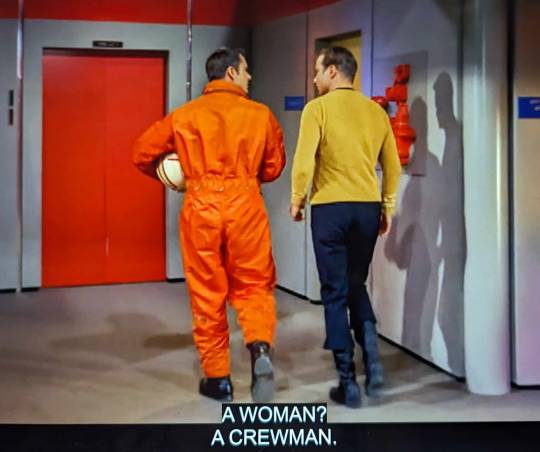
Berman brought some of his own personal biases into Star Trek that in some ways regressed it. While TOS had blatant sexism and was called on it time and again, that show was made in the 60s -- a solid 21 years before TNG. We as a modern audience understood why some of it was cringe/sexist due to the time period -- look at any other media coming out in the 60s and Star Trek was miles ahead of what other shows were doing.
Compare that to Berman who was churning sexist stuff out when women like Starbuck and Scully were simultaneously on screen on other programs airing, and we had already had Sigourney Weaver and other strong women in Holywood playing respectful roles.
In my eyes, there was no need of the sexism seen in TNG but especially VOY and ENT. There was no excuse for it when other shows were writing women far better and a number of those weren't even set in the future like Trek was, making it age even faster due to having those dated perspectives frequently highlighted.
In the Center Seat documentary as well as "The Fifty Year Mission" book you will find cast members, writers and other studio alumni who attest to this. Some discussions from "The Fifty Year Mission":
"First, Berman was supposed to have been a real sleaze ball . . . According to Terry Farrel, he would go on constantly about how her breasts weren't big enough, how she should do something about it, and how his secretary was a good example to follow as she had huge breasts. She even had to have fittings to get larger bras, and that was all done at his behest.
Later Berman and Braga developed a name for Jeri Ryan's character prior Seven of Nine. They originally called the character "perineum" which if you look it up it is the area between the anus and the scrotum. Later they floated the name "6 of 9". I mean, what does it tell you about where these two were coming from in the development of this character if they had names like that put forward in all seriousness for her?"
Gene Roddenberry also had some of his own more progressive ideas for TNG cut or watered down by Berman. Roddenberry agreed TNG should have homosexual relationships and representation at a con in the 80s and insisted on it in a meeting with his writers -- something Berman later would not honor. Gene wanted the AIDS episode, showing m/m and f/f in the Riza scenes -- these were some of Roddenberry's requests to include in TNG that Berman later stonewalled.
Berman's era was sadly dated by his own misogynist bias, IMO, to the point that it can somewhat hurt the shows he worked on through his cringe egoism and blatant disrespect toward his female cast.
There is a reason why Gene could keep female actresses working with him and Berman had a revolving door of women that he couldn't seem to keep working for him -- he was abhorrent to women, on and off set. Gene wasn't perfect at all, he had a lot of issues himself -- but Berman was a whole other level. Just look at what he did to poor Jolene Blalock, Marina Sirtis and his toxic commenting on her body weight which exacerbated her struggles with eating disorders, or how he treated and talked to Terry Farrell.
Anyway, just some food for thought. I'm not saying anyone is wrong regarding a take like that, but there are a variety of ways to look at this. Gene Roddenberry isn't a saint by any means, but it definitely bothers me how folks will tote the Berman era as if it were the lesser of two evils or the more progressive depiction of women when I felt there were far more concerning portrayals of women in his era with far less justification.
(P.S: I don't event want to go near the sheer amount of "creepy old dude/villain preys on innocent/naïve/scared young woman or little girl" stories there were in Berman's era, either. But that's a whole other can of worms I can write about in a part 2.)
#star trek#star trek tos#star trek tng#star trek voy#star trek ent#star trek ds9 was the one show that went above and beyond#1shirt2shirtredshirtdeadshirt#oc#octrekmeta#octrek#gene roddenberry#rick berman#brannon braga#kirk#spock#uhura#rand#nichelle nichols#majel barrett#grace lee whitney#tos#tng#voy#ent#marina sirtis#jolene blalock#terry farrell
3K notes
·
View notes
Text
BRYAN FULLER: I’ll give you a personal angle into the story. I’m the youngest of five and I watched my parents play my sisters off of each other to the point that they haven’t spoken to each other in forty years. I saw that happening with Rick playing Brannon and Ron off of each other in a way that caused them both to behave outside of their natural states, because insecurities were played on, exposed, manipulated. What happened between Brannon and Ron boils down to bad parenting on Rick’s behalf.
Rick would taunt Brannon, saying things like “I should have hired Ron to run Voyager instead of you.” So of course Brannon is going to be insecure and vulnerable. Brannon is a very complicated guy, but an amazing storyteller and a good guy ultimately. Both Ron and Brannon are good guys. But when you’re in a situation where you are feeling vulnerable and insecure and you’re having somebody essentially say I wish you were more like that guy, you’re going to resent that guy. And when that guy is told “I wish Brannon was more like you,” then you’re going to feel like you should come in and you should be in a position where you’re exerting a certain sense of control over the story. So I feel like both of them were victims of bad parenting in that scenario.
BRANNON BRAGA: Ron came in with a very strong point of view and I was irrationally resistant, because I felt that I had just earned my keep as a showrunner. I felt a little threatened by my old colleague, which was silly of me. Ron is always one to push the boundaries, and I wish I’d listened to him.
RONALD D. MOORE: I think at the heart of it is that when we were partners, I was something of the senior partner, because I started a year before him. And in our relationship as people, I took somewhat of a more dominant role. It was a marriage and a partnership. I’m not saying I was number one and he was number two, but there was a certain dynamic between the two of us that I was used to, saying what I wanted to do and not the other way around. And then I was going to work for him and he was a different person running that show. This is from my perspective, but he seemed less willing to take chances. He seemed more afraid of changing the show, and his arguments were feeling a lot like Rick’s arguments about what Star Trek was and what it wasn’t. He still had his Brannon ideas about weird science-fiction things and strange concepts and bizarro time travel. Things that were kind of his signature at the time. But the character work, he was not as receptive to really challenging the characters. A lot of things I eventually put into Battlestar Galactica, I started pitching to him originally.
There was a story in development when I was there about them coming across an alien fleet and they were going to shepherd them for a time. I remembering talking about Battlestar Galactica, the original show, and saying, “Hey, it could be something like that except we could do it where there’s votes by these civilians and they don’t want Janeway to always be in charge. And there should be culture there.” I kept saying that I want the internal culture on Voyager to change over time. Why don’t they put the leadership of the starship to a vote at some point? Is Janeway literally going to captain this ship until she’s eighty? Is Chakotay always going to be the number two? If these guys really don’t think they’re getting back to the Alpha Quadrant for seventy or eighty years, shouldn’t they start thinking long-term? Shouldn’t they sort of let their hair down a little bit? What if they don’t want to wear their uniforms on a Friday? What if they want to decorate the halls? What if they start customizing this ship because it’s probably a generational ship? And they were not open to those concepts. Brannon was not open to those concepts. It was like changing the show too much: “That’s not Star Trek. That’s not what the audience wants to see. I don’t want to see Janeway get votes.” He was very contemptuous about some of it, and I bristled at that. I just felt like they weren’t willing to try to change the show, because in their minds they thought the show was working fine and it didn’t need to be challenged. I was the one saying no, this does not work. This can be better. This is not good.
I kept pushing, and out of that dynamic Brannon stopped wanting to have me in meetings and stopped wanting me to be around, and then the whole thing blew up once I found out that they literally were having meetings where I wasn’t around and they were developing stories that I wasn’t a part of, and the staff had been told not to tell me these things. I walked into Rick’s office and said, “I want out.” He was shocked and Brannon was shocked, and Brannon and I had it out. It was a hard, very emotional and painful scene. Brannon said, “You’re right. I’m sorry. I don’t know why it’s been like that, but I’d really like you to stay.” But I was just done. I just wanted out. It broke my heart and I was angry and hurt. At that point I didn’t think I’d see my participation in it. It was his show and I acted like it was my show, which was not the smartest move. I really underestimated what it would be like to go work with him again. In my heart, I was ready to move on. I should have left Trek at the end of Deep Space Nine and taken on other challenges. Instead I went for comfort and ease and it blew up on me.
BRANNON BRAGA: Now I think it was best he left, because he was frustrated with me. On the one hand I wish I had responded differently, because I think the show would have been better for it. But then again, if he had remained, Ron might not have gone on to do Battlestar Galactica—which, in my view, is what he wanted to do with Star Trek. Every show creator has their moment, their show, and I really think Battlestar was Ron’s best work. It was what he was yearning to do with Star Trek, but was constrained by the premise.
— “The Fifty-Year Mission: The Next 25 Years” by Edward Gross and Mark A. Altman
204 notes
·
View notes
Text
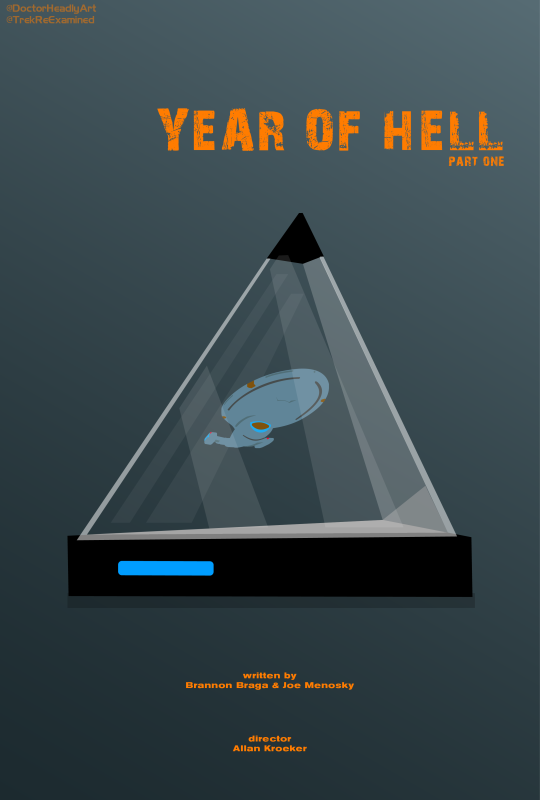
I give "Year of Hell, part I" (S04E08, Stardate 51268.4)high marks for the big swings it takes. An antagonist with no interest in negotiation, Voyager unaware they are being messed with until the end of the episode, and finally forced to contend with life far away from home without support. Lots to chew on here.
#episode poster#episode art#star trek art#star trek#star trek poster#star trek fan art#fan art#star trek voyager#year of hell#krenim#brannon braga#Joe menosky#time travel
57 notes
·
View notes
Text
In 1967, a hippie named Henry Starling found the remains of spacecraft from the 29th Century that had come back through time because of a time rift. Starling copied the technology and started his own company called Chronowerx that lead to the micro computer revolution in the 1990’s. ("Future’s End", Star Trek Voyager, TV)
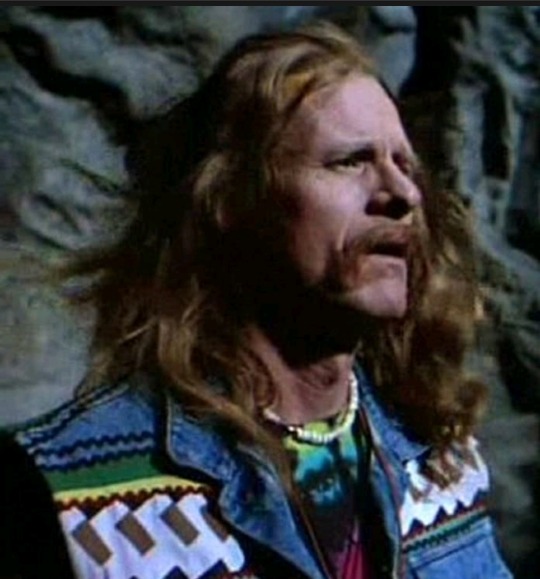
#nerds yearbook#first appearance#sci fi tv#star trek#star trek voyager#1967#1990s#time travel#brannon braga#joe menosky#david livingston#ed begley jr.#henry starling#sarah silverman#captain janeway#kate mulgrew#robert beltran#roxann dawson#jennifer lien#robert duncan mcneill#ethan phillips#robert picardo#tim russ#garrett wang#allan royal#susan dalian#majel barrett#tarik ergin
27 notes
·
View notes
Text

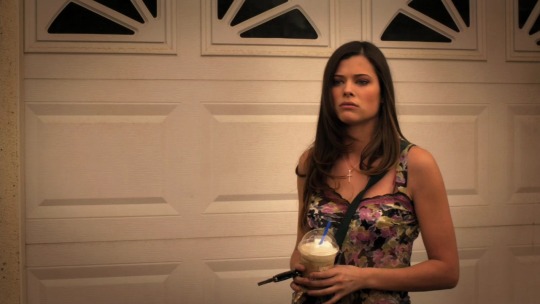
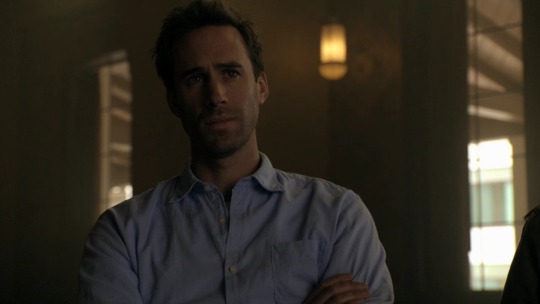
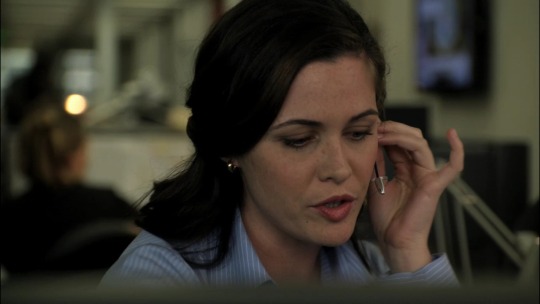
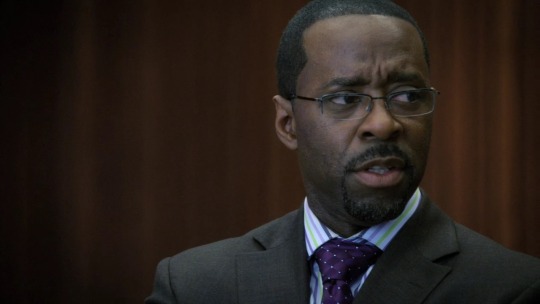

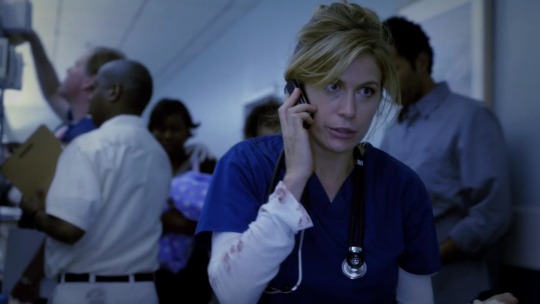


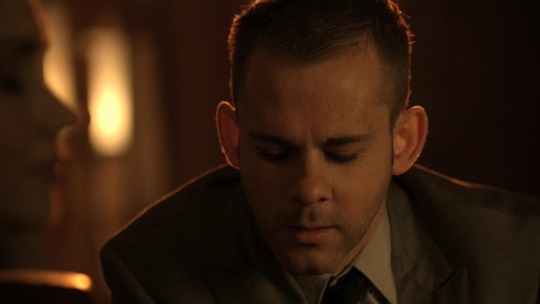
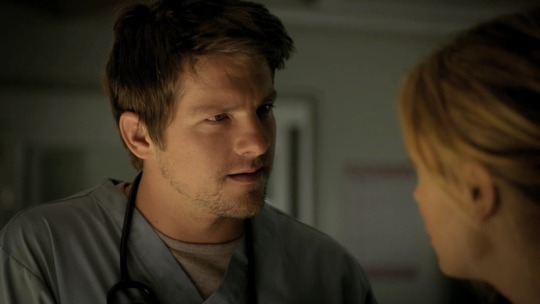

FlashForward (2009-2010) an adaptation by David S. Goyer and Brannon Braga of a Robert J. Sawyer novel of the same name, featuring an all star cast.
#Lol I rewatched the pilot last night w renae who hadn't seen it#(Dominic Keating does not show up tll ep 6)#FlashForward#David S. Goyer#Brannon Braga#FlashForward Rewatch#<- siiiiiiiigh might as well tag that bc.....mmhmmm
12 notes
·
View notes
Text
Brannon Braga is going to be at STLV and now I want to have him sign something for Threshold
#him: this episode was horrid please forget it#all of us: we're going to form a holiday around the release of the episode#star trek voyager#star trek#brannon braga#threshold
4 notes
·
View notes
Text
Seeing a lot of people complain about Terry Matalas naming planets after himself in Star Trek Picard.
He didn’t.
The M’talas system was named after him by Brannon Braga while he worked for Braga as his assistant when he was writing for Enterprise.
17 notes
·
View notes
Video
snippets pt. 2
#enterprise things#scott bakula#john billingsly#jeffrey combs#jolene blalock#linda park#brannon braga
26 notes
·
View notes
Text
Int. Star Trek Writer’s Room
writer 1: so that’s why we feel it’s important for us to make it clear that Garak and Bashir are in a sexual relationship.
[five writers nod in agreement]
Braga: We will never, ever have an overt gay relationship on Star Trek- over my dead body, do you understand? it’s utterly impossible. Berman and I are hard on this No one would believe it, no one would accept it, I don’t accept it. Berman sure as hell doesn't accept it. In fact, Garak is too gay. Give him a teenage girlfriend.
[writers mutter in disagreement]
writer 2: can we at least talk about Dax and gender representation?
writer 3: that’s right. I had some thoughts on Dax’s pronouns-
Braga: -enough! Never! Now, if you’ll excuse me, I have to go write my episode of Voyager where Tom Paris and Janeway turn into lizards and have lizard babies.
#star trek voyager#star trek ds9#garak#elim garak#dr bashir#julian bashir#brannon braga#Happy threshold day#Queers and star trek#Pretty sure it’s mostly queers who celebrate threshold day because we’re mad we got so little representation#tom Paris#Janeway#kate mulgrew#robbie duncan mcneil#why did Star Trek find it more believe that the captain turned into Lizard than to have a consensual queer relationship?#threshold day#jadzia dax#Why was Star Trek ok with a 50 year old man having a relationship’ with a literal teenage girl but can’t let Jadzia be with her former wife#berman and braga ruined legacy trek and you cannot change my mind
18 notes
·
View notes
Photo

#Star Trek First Contact#Patrick Stewart#Brent Spiner#Alice Krige#Jonathan Frakes#Rick Berman#Brannon Braga#Ronald D. Moore#Gene Roddenberry#VHS#90s
18 notes
·
View notes
Text
Watching the second episode of season 3 of The Orville with my spouse
Making so many jokes about how Brannon Braga must’ve written this episode because who else has a transformation/evolving/de-evolving fetish?
Am only half paying attention because I’m knitting
Spouse, who is not a Star Trek person, hears the words “reproduction” and “mating call” and googles the writers
It’s Brannon Braga
IT’S
FUCKING
BRANNON
BRAGA
Also I broke my glasses by collapsing on the floor laughing
10 notes
·
View notes
Text

Confession #31
"I'm glad more and more people in the Star Trek fandom are acknowledging what a creep Rick Berman was to the series' actresses but can we also acknowledge that his cohort, Brannon Braga, was also a creep to women as well?"
#infamous duo edit.jpeg#confession n.31#star-trek-fandom-confessions#star trek#rick berman#brannon braga#sexism mention
14 notes
·
View notes
Text
I finished watching "The Orville" today and I have a few thoughts on my mind.
It is a cowardly series. Cowardly in its approach to the issues it deals with, cowardly in its resolutions, cowardly when it comes to facing the consequences of those resolutions, and cowardly in general when it comes to pronouncing itself on the reality it seeks to portray. "The Orville" is Star Trek with the serial numbers erased, and at the same time it does not dare to be Star Trek. When it tackles issues of social justice it does so tepidly and obliquely, implying that at best, the future of humanity is little more or less than expecting the same as it is today, or the typical post-Reaganian anti-government individualist fantasy. "We're going to let this keep happening because it's politically inconvenient to change the Status Quo" is a message that is repeated over and over and over again throughout the series. Yes, it is a message that is made clear that is negative, but is the message that is being given to the viewer: In the future, the oppression of minorities will continue to be subservient to political needs, sorry UwU
"The Orville" is not, and never was, a parody, an edgy version or a re-imagining of Star Trek: It was a rejected Star Trek project that ended up taking on a life of its own. The sources it draws from are the same (Hello, Brannon Braga! Happy Threshold Day!), or so it pretends, because what "The Orville" did and what Star Trek does are two very different things.
I'm not going to go into Seth MacFarlane's Star Trek screenwriting ability: He doesn't have it.
All the digital effects and models can't make up for the basic shortcomings of not knowing how to execute stories that have been done since the 1940s in science fiction. If you do a classic story, don't be shy and make it classic (Star Trek has done "Enemy Mine" no less than 5 times in its various series!), but if you can't understand what the elements of the story are, don't try to put a twist on it.
There are brilliant ideas in "The Orville" (poorly executed mostly). There are interesting moments. There is good science fiction sometimes. But there is too much ethical and human cowardice to pretend to stand alongside Star Trek and look it in the eye as an equal.
#Star Trek#The Orville was like metadona...#And I don't want to enter the supposed humorous part of it.#Brannon Braga#Happy Threshol Day!
2 notes
·
View notes
Text
The starship Voyager fell through a time rift after battling a spacecraft from the 29th Century. A hippie named Henry Starling had found the remains of the spacecraft from the 29th Century that had come back farther through time to 1967 because of the time rift. Sterling copied the technology and started his own company called Chronowerx that lead to the micro computer revolution in the 1990’s. The Voyager crew confronted Starling in 1996 but ended up getting their ship’s computer hacked by him. They learned that Starling was building a timeship to try to travel to the future to steal more technology, but they also learned that this would bring about a huge galactic tragedy. When the captain of the Voyager couldn’t convince Starling not to use the timeship, she was forced to destroy his timeship before he could enter the time rift. ("Future’s End pt 1 & 2", Star Trek Voyager, TV)

#nerds yearbook#sci fi tv#first appearance#star trek voyager#star trek#time travel#1996#1967#2373#chronowerx#david livingston#brannon braga#joe menosky#ed begley jr#henry starling#sarah silverman#rain robinson#kate mulgrew#kathryn janeway#robert beltran#chakotay#roxann dawson#b'elanna torres#jennifer lien#kes#robert duncan mcneill#tom paris#ethan phillips#neelix#robert picardo
18 notes
·
View notes
Photo
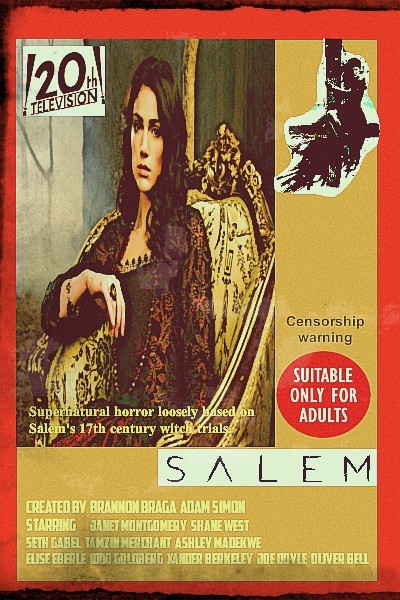
#salem tv show#tv shows#brannon braga#adam simon#janet montgomery#shane west#seth gabel#tamzin merchant#ashley madekwe#elise eberle#iddo goldberg#xander berkeley#joe doyle#oliver bell#illustration#vintage art#alternative movie posters
3 notes
·
View notes
Text
A Look Back at Star Trek: Generations comic book adaptation (1994)
Disclaimer: This is my original work with details sourced from reading the comic book and doing personal research. Anyone who wants to use this article, in part or in whole, needs to secure first my permission and agree to cite me as the source and author. Let it be known that any unauthorized use of this article will constrain the author to pursue the remedies under R.A. No. 8293, the Revised…
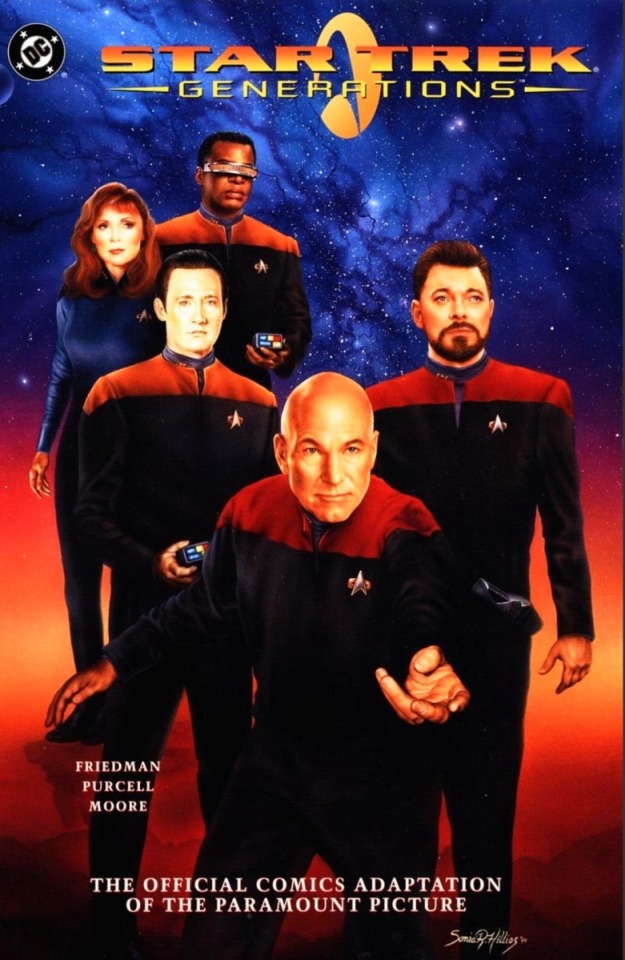
View On WordPress
#1990s#amusement#Beverly Crusher#blogger#blogging#Brannon Braga#Brent Spiner#cinema#comic#comic book#comic book adaptation#Comic Book Review#comic books#comics#comics blog#crossover#Data#DC Comics#Deanna Troi#entertainment#entertainment blog#film#fun#Gates McFadden#geek#Geordi La Forge#Gordon Purcell#illustrated literature#James Doohan#Jean-Luc Picard
1 note
·
View note